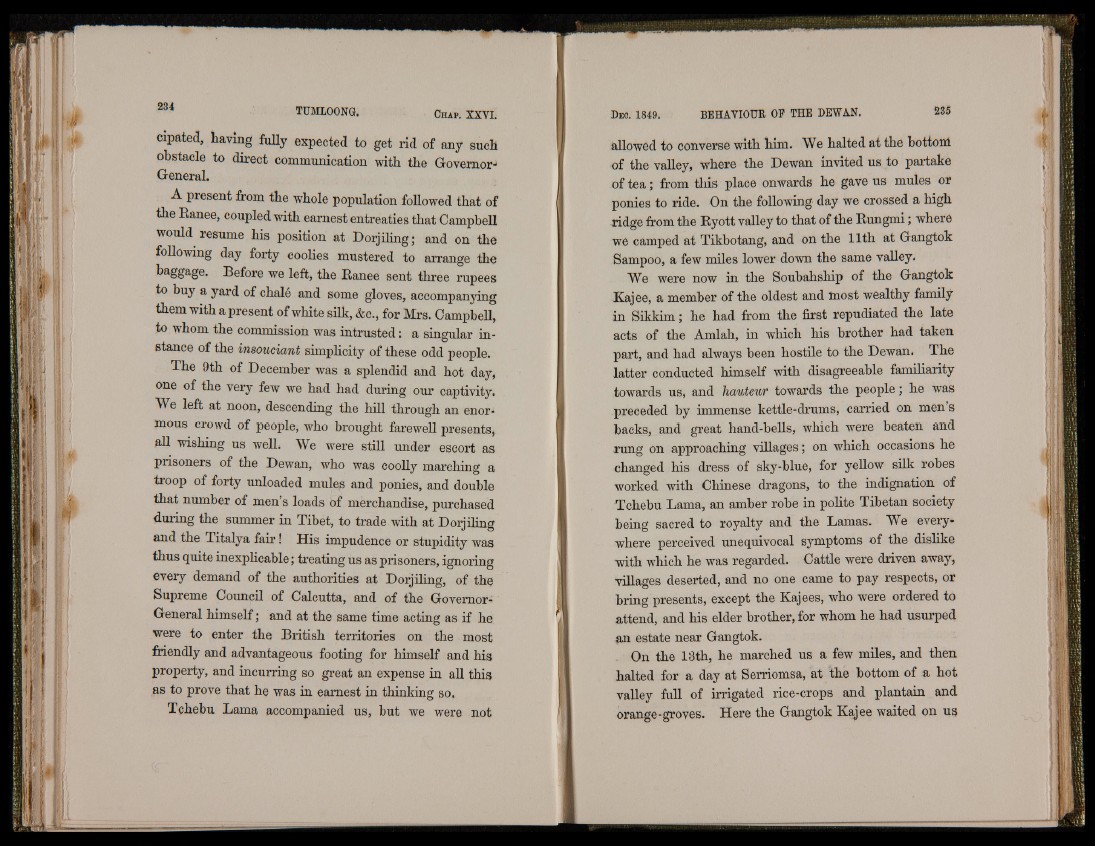
cipated, having fully expected to get rid of any such
obstacle to direct communication with the Governor-
General.
A present from the whole population followed that of
the Ranee, coupled with earnest entreaties that Campbell
would resume his position at Dorjiling; and on the
following day forty coolies mustered to arrange the
baggage. Before we left, the Ranee sent three rupees
to buy a yard of chalé and some gloves, accompanying
them with a present of white silt, &c., for Mrs. Campbell,
to whom the commission was intrusted: a singular instance
of the insouciant simplicity of these odd people.
The 9th of December was a splendid and hot day,
one of the very few we had had during our captivity.
We left at noon, descending the hill through an enormous
crowd of people, who brought farewell presents,
all wishing us well. We were still under escort as
prisoners of the Dewan, who was coolly marching a
troop of forty unloaded mules and ponies, and double
that number of men’s loads of merchandise, purchased
during the summer in Tibet, to trade with at Dorjiling
and the Titalya fa ir! His impudence or stupidity was
thus quite inexplicable; treating us as prisoners, ignoring
every demand of the authorities at Dorjiling, of the
Supreme Council of Calcutta, and of the Governor-
General himself; and at the same time acting as if he
were to enter the British territories on the most
friendly and advantageous footing for himself and his
property, and incurring so great an expense in all this
as to prove that he was in earnest in thinking so.
Tchebu Lama accompanied us, but we were not
¡allowed to converse with him. We halted at the bottoni
of the valley, where the Dewan invited us to partake
of te a ; from this place onwards he gave us mules or
ponies to ride. On the following day we crossed a high
ridge from the Ryott valley to that of the Rungmi; where
we camped at Tikbotang, and on the 11th at Gangtok
Sampoo, a few miles lower down the same valley.
We were now in the Soubahship of the Gangtok
Kajee, a member of the oldest and most wealthy family
in Sikkim; he had from the first repudiated the late
acts of the A ml ah, in which his brother had taken
part, and had always been hostile to the Dewan. The
latter conducted himself with disagreeable familiarity
towards us, and hauteur towards the people; he was
preceded by immense kettle-drums, carried on men s
backs, and great hand-bells, which were beaten and
rung on approaching villages; on which occasions he
changed his dress of sky-blue, for yellow silk robes
worked with Chinese dragons, to the indignation of
Tchebu Lama, an amber robe in polite Tibetan society
being sacred to royalty and the Lamas. We every*
where perceived unequivocal symptoms of the dislike
with which he was regarded. Cattle were driven away,
villages deserted, and no one came to pay respects, or
bring presents, except the Kajees, who were ordered to
attend, and his elder brother, for whom he had usurped
an estate near Gangtok.
On the 13th, he marched us a few miles, and then
halted for a day at Serriomsa, at the bottom of a hot
valley full of irrigated rice-crops and plantain and
orange-groves. Here the Gangtok Kajee waited on u§